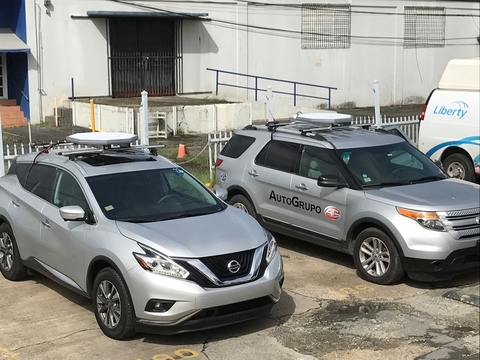Antenna provider Kymeta is using its unique antenna technology to deliver connectivity to relief workers and others in Puerto Rico, where about 60% of cell sites remain out of service.
Kymeta says its technology is uniquely qualified to provide service—and it doesn’t have to be stationary in order to deliver it. In fact, that’s the whole idea: put a flat antenna on a car or other vehicle and provide connectivity wherever it travels. A total of three vehicles are on the island equipped with the antenna gear.
“While mobile and even under very rapid motion and acceleration in turns, we stay locked onto the satellites and continue to provide broadband connectivity,” explained Nathan Kundtz, founder, CEO and president of Kymeta. That ties back to his research in metamaterials at Duke University and later at Intellectual Ventures in Bellevue, Washington, and explains in part why Bill Gates was an early investor.

In Puerto Rico, FEMA workers are using the technology to connect their laptops to the internet and help people through the application process for FEMA assistance. The vehicles are driving throughout the island to deliver internet connectivity where it’s needed, primarily in hard-hit and rural areas. Walgreens and Duracell are involved as well.
It’s also working with Liberty Global, an early investor in Kymeta that happens to manage a cellular network with a significant footprint in Puerto Rico. Intelsat is also supporting the effort with capacity. (Kymeta’s name came up more than once during an Oct. 25 U.S. Senate Committee on Commerce, Science and Transportation hearing where Intelsat CEO Stephen Spengler was presenting.)
RELATED: ViaSat, Intelsat, OneWeb cite access to spectrum as big concern
Whereas Alphabet’s X Project Loon got the go-ahead to launch balloons and provide service with AT&T and others in Puerto Rico, that so far only worked with LTE devices that support band 8. Kymeta’s deal allows anyone with Wi-Fi calling enabled on their phone to use the service, and it's available 24/7.
What Kymeta is doing in Puerto Rico is reflective of a broader set of communications problems that exist all over the planet, not just when disaster strikes, Kundtz told FierceWirelessTech. While it's working in Puerto Rico, the company also has a presence in Japan, where it's driving a vehicle with an embedded antenna around the country in partnership with JSAT and Toyota.
The Redmond, Washington-based company is working with others on the vision of having flat panel antennas on public safety vehicles like fire trucks so that first responders will have connectivity wherever they go. That was one reason Kymeta partnered with police in Greenville, South Carolina, during the eclipse in August. A lot of municipalities want the ability to keep their first responders connected while they’re on the way to an event, and crowded events are often when cellular systems get overloaded.
RELATED: Kymeta drives away from eclipse with renewed focus
Kundtz said the cost of capacity is now competitive and on track to drop below the cost of cellular capacity, and that’s particularly true anytime you can do one-to-many data distribution, like multicast content delivery. The active components in its antennas are built on the same production lines that make televisions, “so we see a tremendous opportunity to be able to come in very quickly to consumer price points,” he said.
The mission in Puerto Rico will last at least the next two months and might be extended depending on the need.
In August, Kymeta received blanket authorization from the FCC for commercial distribution of 11,000 of its KyWay terminals in the United States, which allows the company to operate 5,000 vehicle-mounted Earth stations, 5,000 fixed IoT installations and 1,000 maritime Earth stations on vessels. It also received authorization from Ofcom to provide service to an unlimited number of vehicle-mounted, shipboard and IoT installations in the United Kingdom.